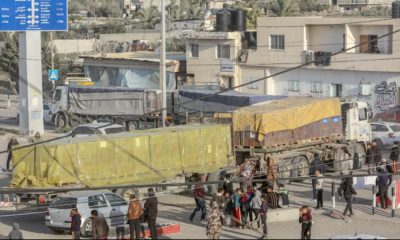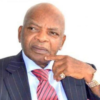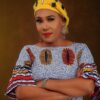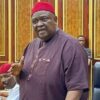News
Nigerian Leaders: O Wrong Nau!
Na only God fit save us from this kontry. Which kainwahala be this? Cried Ejiro, a forty-year-old commercial road transport worker. To unsuspecting individuals, his outcry could have passed for the cries of a lazy person—one who perhaps works little and cries more. But to the majority around the park, Ejiro is a definition of hard work and tolerance. Within five years, he had managed to expand his business and now owned three commercial buses despite all odds. Then, what seems to be the problem? Just like Ejiro, a larger percentage of Nigerians continually lament over the state of the nation, particularly as it seems to affect them the most. Nigerians across various professions have sung the same song for long. The collar of one’s job seems not to matter now. The white-collar people are shouting, and blue-collar guys are in despair. Na everyone dey collect.
Nigerian Leaders, O wrong nau!
Nigeria has enjoyed independence from British colonialists for over sixty years, with successive governments taking charge of its affairs. The country has seen its share of military intervention in government before the final transition into a democratic state in 1999. As the most populous country in Africa, the country is a formidable force in continental and grassroots politics. Despite this, the country maintains an almost consistent ranking on global poverty, corruption, and unemployment rankings. Surprisingly, this is a country endowed with over 44 mineral resources and a landmass that encourages agriculture. All these, coupled with the large human power available, are enough to earn the country a seat amongst World Superpowers. However, the reverse is the case. The failing state of Nigeria’s economy and the state of the nation is largely attributed to many factors, of which the cost of governance carries the bulk of it all. Since the 1914 amalgamation, the country has run a very robust system of government through supposed representative democracy. Due to its large nature, the exorbitant expenses incurred in the smooth running of the state over the past years have contributed to the detrimental effects experienced today. These disturbing figures have created concerns long enough for the helpless masses. While Nigeria still underperforms compared to other countries, one might ask what government officials have put in place to justify the running cost for their various offices.
Nigerian politicians, o wrong nau!
At the Federal level, Nigeria expends a major part of itsbudget on running the Presidency and the National Assembly. This is made possible by the armies of retinues, special advisers, senior special assistants, appointments, and otherpositions tied to these arms of government. As a practice, the presidency reserves the right to appoint persons for positions,and he has exploited this in placing people in positions that are of limited benefit to the country. The proliferation of government agencies and departments increases administrative costs and creates redundant positions. Another avenue apart from this is the amount spent on luxuries and conveniences. The Presidential fleets and convoy, without doubt, is one major avenue by which Nigerian leaders flex their muscles. The show of power and might that comes with unlimited cars in a long convoy at the expense of the masses are of no use to the public. This ostentatious way of servitude for the good of Nigeria bothers the citizens greatly. At its inception, the new administration promised a more strategic approach to revenue generation. Calculating the sum of each car in the convoy of the president, ministers and other federal appointees, one will begin to reason how many projects they can finance.
The 2023 budget, as seen, expended the sum of N2.29bn to the State House for the purchase of vehicles, overhead maintenance of vehicles and transport equipment, and fuel. This allocation is better utilized in other sectors for the masses. The previous government proposed to spend N12.5 billion (12,550,018,897) on the Presidential Air Fleet (PAF). This comprised N3.9 billion (3,934,390,091) for overhead and N8 billion (8,175,622,044) capital allocation. It covered the total maintenance, security, fuelling, and payment of salaries for crew, internet, food, and catering aboard the fleets. Aside from these, there are other undocumented expenses by the executive arm of the government. The projects by Special Assistants, and other appointees, their running costs, and other money they are entitled to ask for are some of the expenses that can wreck the economy. What are over 50 people travelling abroad with the president for? Why should a minister travel with a train of almost a football team? Who pays for accommodation, feeding, and allowance? But o wrong na!
Nigeria has about 468 members and senators in the National Assembly, all with allowances, running costs, and money claimable for projects. Senator Shehu Sani had disclosed that they are entitled to N700,000 salary every month, a running cost of N13.5 million monthly, and a fund of up to N200 million, claimable for constituency fund of N200 million naira. We all know where these constituency funds are going, or should I say we rather not know? Running cost and salary in a month would be N6, 645,600,000, more than N79.7 annually for official costs. Imagine one calculates what 200 million per lawmaker would cost. Aside from the fact that one cannot say how this money is spent with finality, what about other cuts and percentages that go to the politicians off records? Or why do politicians mostly spend cash rather than transfers? This outrageous expense does not also capture the salaries of the 829 combined staff and aides of senators who are paid from the coffers of the National Assembly.
Nigerian Leaders, O wrong nau!
Every month, the federal government gets 56% of the funds, while 44% of the government is disbursed to the state governments. Local governments are entitled to 20% of the funds released to the states through the Joint Local Government Account. What this translates to is that we have 36 state governors and 36 deputies, 774 local government chairpersons, 1022 members of the State House of Assembly, numerous numbers of commissioners, councillors, aides, support staff, and retinues of assistants. All these are being catered for with government funds. One can imagine what percentage of the nation’s wealth is assigned to these persons. Yet, our large governments do not reflect the standard of living we know today. The numerous heads put to work, as claimed, have not done much for the suffering masses.
President Buhari made not less than 159 political appointees who would be entitled to offices, employees, running costs, and salaries. Governors also make about 100 appointees with the same privileges. The lawmakers have at least 2 to 3 people working at their offices with government-sponsored salaries. The drama is worse at the level of state Assemblies and Local Government Appointees. It is true that to run a democracy, the people must run the government, but this is not to the detriment of the resources that ought to be used in the development of society. If all the official cars of Special Assistants to the Governors and local government Chairmen are sold, it would certainly empower thousands of Nigerians.
Nigerian leaders, O Wrong Nau!
Imagine a country almost being the headquarters of poverty in the world, using not less than N30.2 billion to renovate the National Assembly in 2021. Remember that about N37 billion was approved in 2019 to renovate the same National Assembly. The 2020 budget, about N128 billion, was allocated to the National Assembly. What about the money allocated to each committee of the house or other boards of other government bodies? Hold on, what happens to the huge security votes of governments in the country? It is the national cake indeed. But Nigerian leaders, o wrong nah.
A more important aspect of the cost of governance is those lines of entitled politicians that sit in their offices to take some cuts on every government project. Hence, awarding contracts attracts different costs that leave the contractors with no choice but to hype the total project cost. In 2021, the Abuja-Kaduna-Zaria-Kano Road, a 375 kilometres road, was reported to have been built with N797 billion, averaging about N2.1 billion for every kilometre. The World Bank stated there is a need for about N238 million to build 1 kilometre road, which is about 10 times the cost in Nigeria. You may call it corruption, but the contractors must account for the egunjethey have paid at every level.
Excellencies, O wrong nau!
Representative government is desirable, but we must cut out coats by size. There is a need for legal and political reformation of the country. The constitution must regulate the number of government appointees for every office and check their budget allocations. There is a need to start making politics less attractive, reduce the cost of governance, remove unnecessary portfolios and reduce the number of lawmakers. Many of these positions are repetitions and duplicates of the others. Nigeria should embrace part-time legislation for its lawmakers and reduce the necessary costs of the Executives and Judiciary. It is time for the country to start pitching into a developmental mindset and set aside personal and selfish gains. O wrong nah.





















